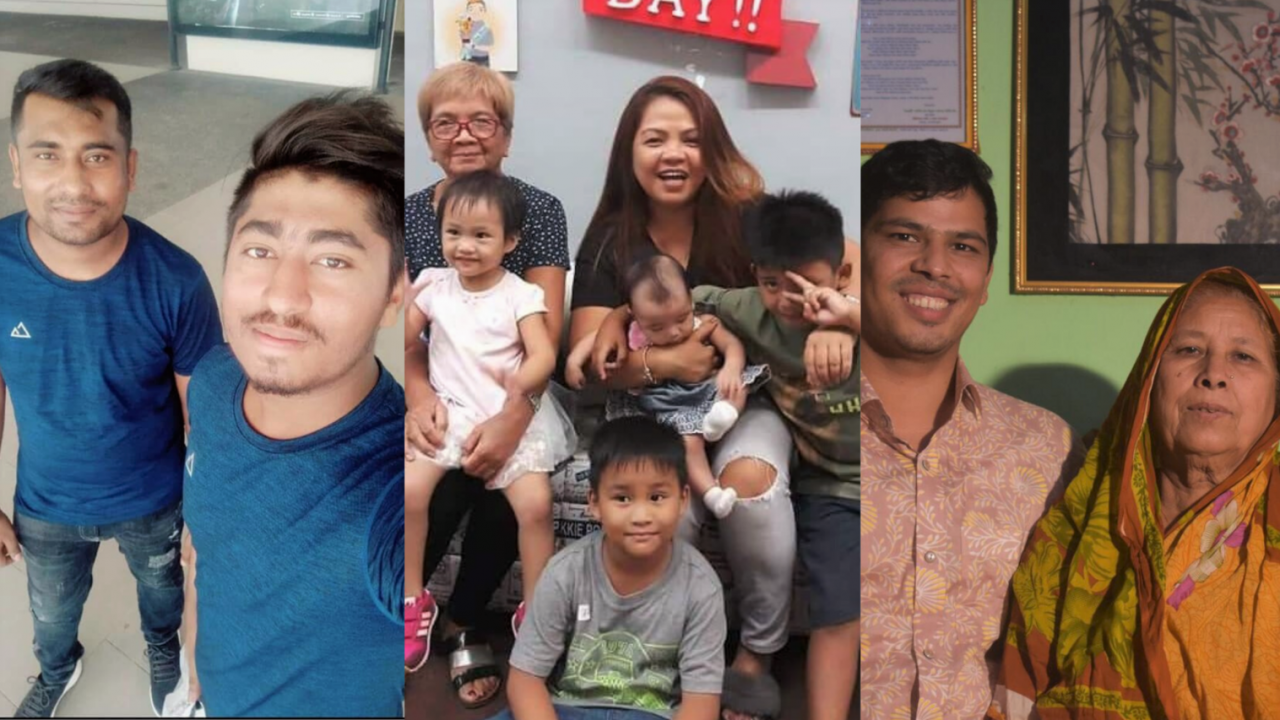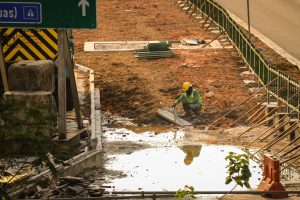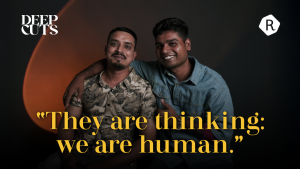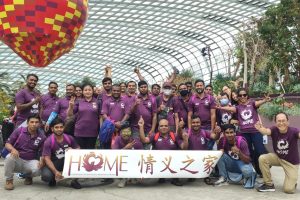Top image: composite by the author. All photos courtesy of interviewees.
Ask any migrant worker why they came to Singapore, and the answer is always, “To earn money for my family.”
Families are central to migrant workers’ stories, and have stories of their own to tell. We would like to share a few of these with you.
These accounts are based on the interviewees’ own stories, as told to us. The interviews with Billal, Mukul, and Bhing were conducted in English; we have tried to preserve their voices as far as possible, with edits focused on structure, length, and clarity rather than expression. The interviews with their family members were conducted in their native languages and translated.
Billal Khan, 28
My mother is 48. She was a schoolteacher before, but now she stays at home to look after my family. We’re very close. Even before, when I was in Bangladesh, I’d share everything with her—about my girlfriend, what I do outside. Sometimes she gives me advice.
I came to Singapore in 2010, when I was 17. It was my decision. We have our land, we can farm, do business, but I wanted to come here to earn more money for my family. My father and mother said no, they wanted me to finish studying. So I applied to the training centre in secret.
My mother was so angry when she found out, but I had already paid money to the training centre. She didn’t talk to me for one month, but after that, she said, okay, you can go. She came with me to the airport, crying all the way. I said, I will come back very soon.
The feeling … how can I explain it? When, after a long distance, after a long time, you see the people you love? In 2015 I went back to surprise my family for Hari Raya. I didn’t tell anyone. I bought a ticket to Bangladesh and arrived at 3:00 AM. I told my sister to keep quiet. Then I saw my father. My mother. I will never forget this moment.
I normally speak to my parents three times a day, in the morning, at lunchtime, and before I sleep. If I miss one time, my mother will panic. Every moment, every second, I miss my mom.
Yesterday, I found out my younger brother, who is also here, has Covid-19. We’re not going to inform our parents. We don’t want them to worry. My brother is going to do phone calls instead of video calls so they don’t find out.
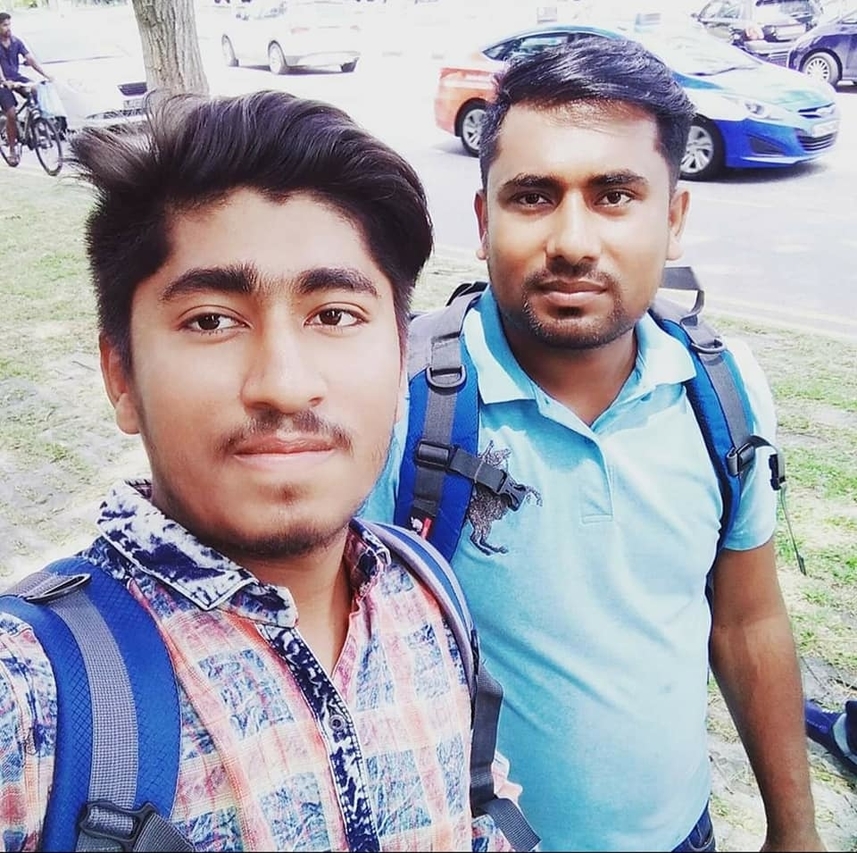
Ruby Akhtar, 48 (Billal’s mother)
Billal is my first child. He’s good and a very caring and loving son. He helps us whenever difficulties affect our family.
I was sad and worried when he said he wanted to come to Singapore. We all miss him so much, now that he’s been away a long time. I miss being able to wake him up every morning. I miss how he’s so helpful with housework.
I worry always about him and his brother. Being a mother, we always want our children to stay with us.
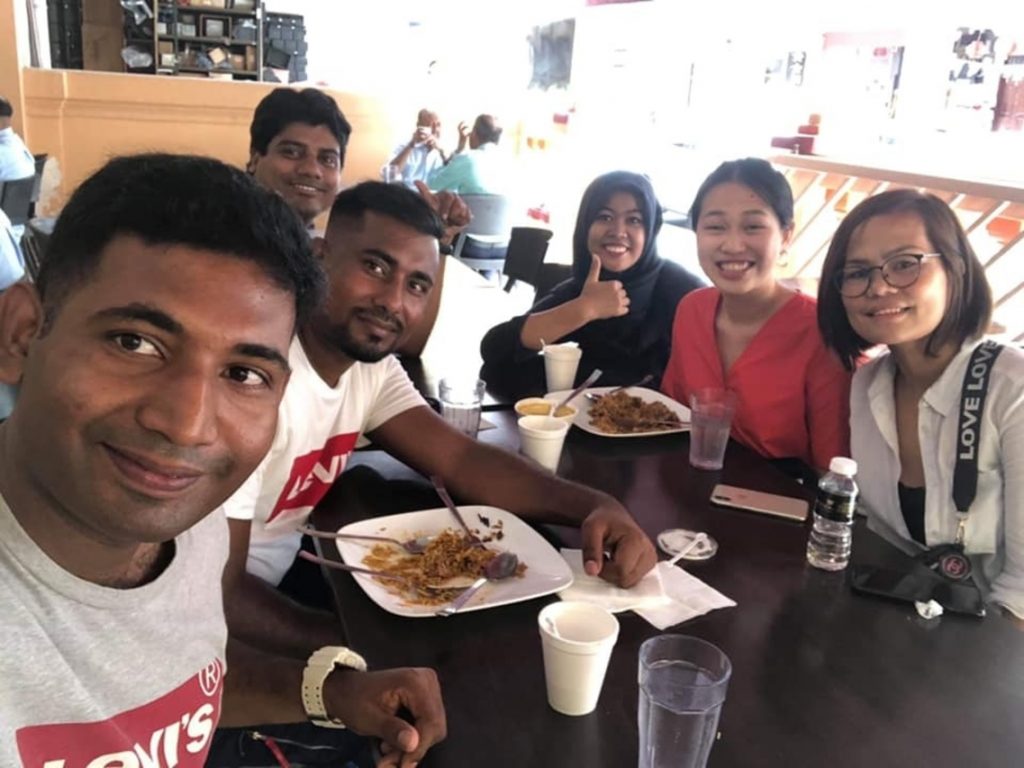
Mohammed Mukul Hossine, 30
My mother is a housewife. She’s 60 years old. I love her so much. She’s friendly and beautiful and kind. She and my dad taught me how to be generous, how to appreciate others.
I came to Singapore when I was 18. My mom wasn’t happy about it. It was very hard for us to say goodbye. I missed her, my dad, my pet rabbit, my garden … For the first two years, she wanted me to come back. We would speak on the phone every day and she would tell me if my rabbit was naughty, or when there were flowers in the garden. But when she saw that I was happy with my life in Singapore, she was okay with it.
In 2016, I published my first book of poems, Me Migrant. My mom was so proud of me. She was always interested when I told her that I was writing poems, or when the newspapers wrote about me and I sent them the pictures.
Sometimes, I write poems about my mom. At first, I would recite them to her. My mom is not super educated but she understands. Then my dad said, Mukul, if you are writing something about your mom, don’t show her, because she feels it in her heart but she will never show you. Actually, she cries and she misses you so much that she cannot work properly. I didn’t know she would feel so sad, so sometimes I keep it secret now.
I’ve been home with her and my dad in Bangladesh since February, because my dad is sick. Every morning, she comes into my room to ask me how I’m doing, what I want to eat. We go shopping at the market and she comments on the clothes I want to buy. This one nice, that one not nice. I like colourful clothes with prints and she likes them too, but sometimes she says they look like girl clothes. We spend every day together now, but she knows I want to come back to Singapore when the pandemic is over.
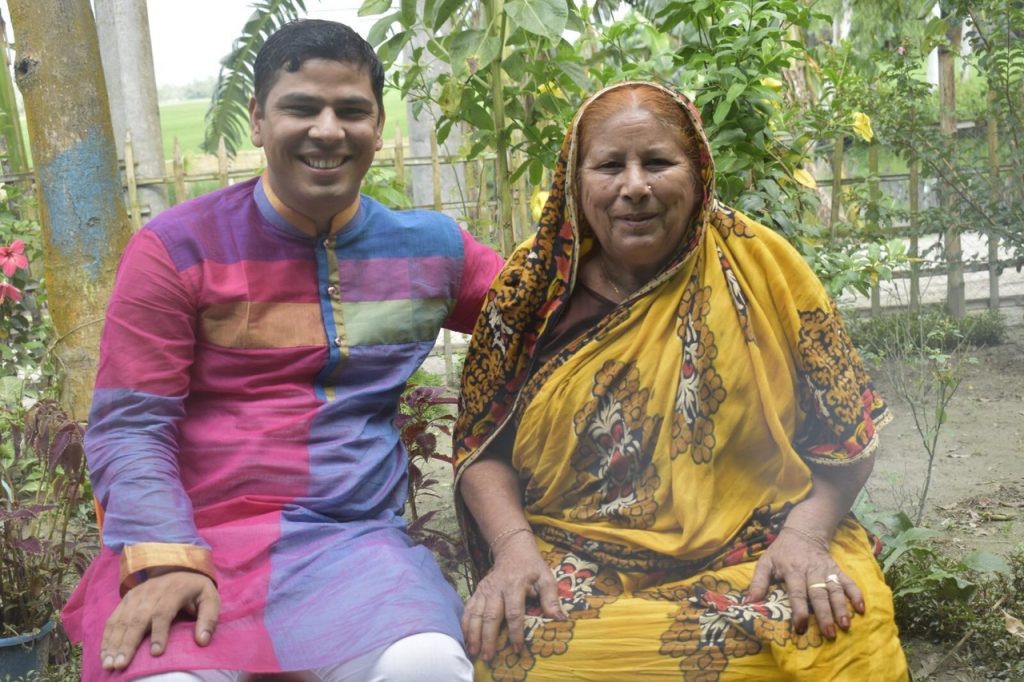
Kulsum Bagom, 60 (Mukul’s mother)
I was very sad when Mukul said he wanted to go to Singapore. I cried a lot and I couldn’t sleep. I bought him clothes and lots of fruit, like apples and oranges, before he left.
The first year he was away was very difficult. I cried a lot and couldn’t sleep because I missed him so much. Now I’m more used to it, but I still worry about him. I call him every day to ask about his work and if he is sleeping properly and eating properly. I miss him when I cook his favourite food and he’s not here to share it.
I was so proud when his book came out. I told all my friends, everyone in our village.
I’m very happy that the pandemic has brought him home and our family is together. We can be happy together and sad together.
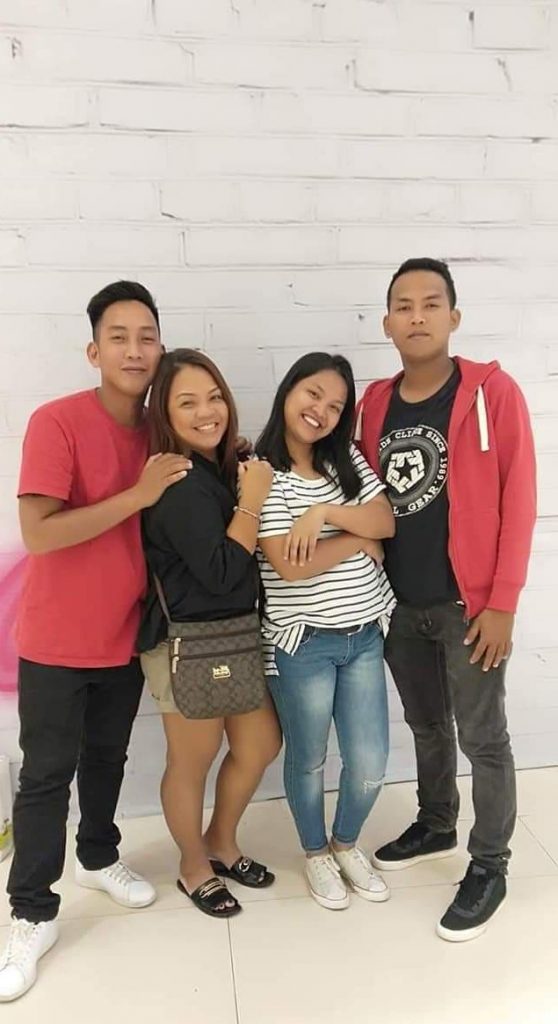
Robina ‘Bhing’ Navato, 47
I came to Singapore when I was 22, and my children were 4, 2, and 1 at the time. My two younger children stayed with my parents, while my older son stayed with his father. Airra, the middle child, is my only daughter.
I still remember one time, when Airra was about 1.5 years old—I even remember what she was wearing, a pair of purple overalls—she was crying and wouldn’t stop. We hadn’t had lunch that day because we didn’t have any money. She was hungry, and she didn’t stop crying until my sister-in-law gave her a cookie. I knew I had to find a stable job to support my children.
I was both sad and excited to come to Singapore, but I felt guilty about not being there for them, and missing things like birthdays and school projects. The first time Airra saw me after I left was six years later, when she was 8 years old. I was wearing makeup, and she looked at me … I think she felt proud of me, like, oh, this is my mother. Because all this time, she’d thought my mum was her mum.
I think she wanted to be close to me when she was growing up, and I wanted that too, but it was hard. I would get busy with work, or she would be busy with school or her friends, and vacations were short, but our relationship changed after she became a mum. We’ve gotten closer, and when I go back for visits, we sleep next to each other, with the grandchildren around us; sometimes she takes a nap on my legs. We spend all our time together.
I’d wanted her to graduate from college, but Airra was 18 or 19 when she became pregnant. She’s closer to my sisters, and I remember feeling jealous when they found out about her pregnancy first. Like, why do you know and I didn’t?
When she got pregnant for the third time, she didn’t want to tell me at first because she knew I would be angry. But I told her that I would always be by her side, and she can tell me everything; that whatever it is, I would accept everything, just don’t expect me to be happy about it. I mean, of course, I’ll be mad, but I’m your mother. And I think she understood.
When my children were small, they used to be shy about saying “I love you”. But now it’s always, “I love you, mama. I love you, mama.” And I’m really happy about this.
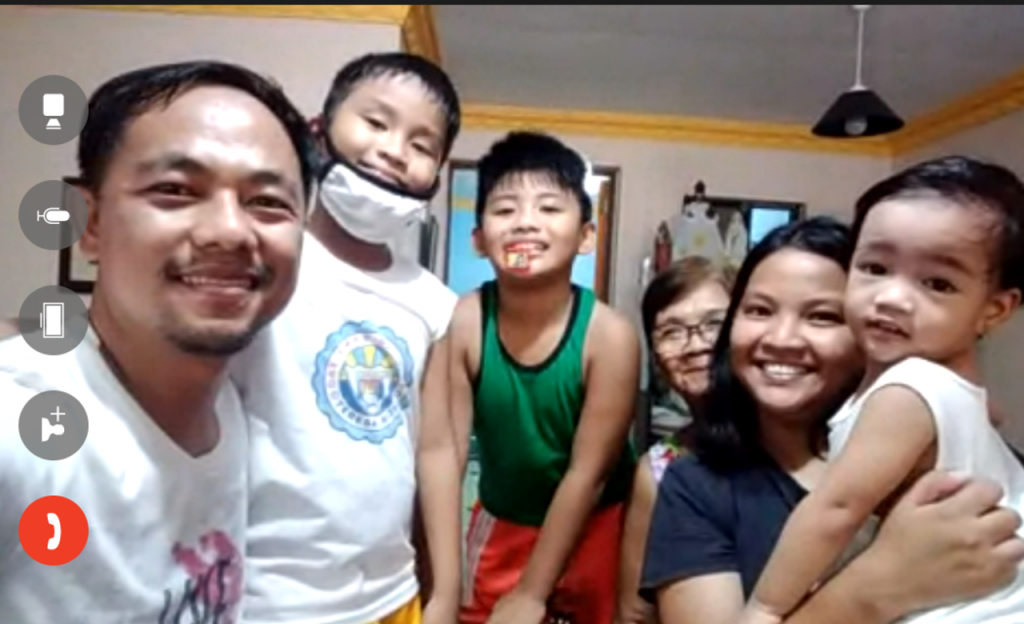
Airra Tejares, 27 (Bhing’s daughter)
I was only 2 when my mom went to work in Singapore, so I don’t remember much from then. My younger brother, Christopher, and I were raised by our grandparents.
When I was about 8 years old, my mom came home for a visit. It was only for a week, so we didn’t have much time, but this was the first time I’d seen her since she left. I thought she was my auntie, until Mama Lita (my grandmother) told me she was my mom. After that, I felt sad when she had to go back.
I stayed in touch with my mom through phone calls and letters when I was growing up. It made me happy to hear from her, but I also missed her a lot, and would tell her to come back to us. Every year, on my birthday, my family would buy me a cake and presents and I’d call my mom.
She visits twice a year now, and whenever she comes, the whole house is full of people — the children, aunties, uncles, cousins … everyone. Our schedule is always packed and I’m always by her side. It makes me happy to have her with us at home.
My mum wasn’t able to be with me when I gave birth to my children, but she was here for Will’s and my wedding, on January 7, 2016. She told us we had to get married on that day so she could be present. We had the ceremony in the morning and she stayed for lunch, before flying back to Singapore in the afternoon.
Whenever she flies back to Singapore at the end of visits, we don’t go with her to the airport. I think it’s because she doesn’t want us to see her cry. But we are always there to welcome her when she comes back.
We would like to thank Billal, Mukul, and Will Tejares for their assistance with translation.
This is the second story in WORK IN PROGRESS, a content series we are running in partnership with the Covid-19 Migrant Support Coalition (CMSC). You can support their work by making a donation here, or by befriending a migrant worker under their WePals initiative. Migrant workers are connected with volunteer befrienders, who provide a listening ear and exchange letters as pen-pals.
Send us your thoughts on this story at community@ricemedia.co.

